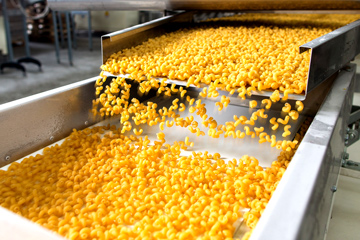Below are common questions about Farm to School and Early Care food safety.
October is Farm to School and Early Care Month, a time to celebrate food education, school gardens, and lunch trays filled with healthy, locally sourced foods from Minnesota’s producers.
In recognition of this month, today the Minnesota Department of Agriculture (MDA) unveiled the state’s first-ever Farm to Kids Strategic Plan. Developed collaboratively by Farm to School and Early Care partners across Minnesota, this plan is a 5-year roadmap for advancing local procurement and agricultural education in K-12 schools and early care settings.
Using insights collected from robust stakeholder engagement with producers, school food service professionals, educators, early care providers, youth, and other members of the public, the Farm to Kids Strategic Plan outlines specific goals, strategies, and actions for future Farm to School and Early Care efforts. The high-level priorities of the plan include:
- Increase purchases of Minnesota-grown and -raised foods by schools and early care settings.
- Improve integration of food and agricultural education in classrooms, cafeterias, and other educational environments.
- Build and activate a strong Farm to Kids network to foster shared, collaborative leadership among Farm to School and Early Care partners.
“For over a decade, state agencies, institutions, and organizations have been working together to support and expand participation in Farm to School and Early Care programs within Minnesota,” said MDA Commissioner Thom Petersen. “We thank all partners — including producers, school staff, and early care providers — for successfully bringing more local foods to students, and we look forward to further progress thanks to the steps outlined in the new Farm to Kids Strategic Plan.”
“Kids who receive nutritious foods at school are kids who are ready learn and grow,” said Minnesota Department of Education Commissioner Willie Jett. “By connecting our youngest learners with fresh, locally grown foods, we’re not only fueling their bodies but also planting the seeds for a lifetime of healthy choices. This program is about more than what’s on the plate — it’s about building stronger communities and ensuring that Minnesota’s children thrive both in and out of the classroom.”
The MDA will host two free webinars via Microsoft Teams to provide an in-depth overview of the strategic plan for interested members of the public, scheduled for:
- Thursday, October 24, 3-4 p.m.
Register for this event. - Tuesday, October 29, 6-7 p.m.
Register for this event.
To review the full Farm to Kids Strategic Plan and learn more about Farm to School and Early Care in Minnesota, visit the MDA website.
Partners in developing and implementing the plan include the Minnesota Department of Education, Minnesota Department of Health, Institute for Agriculture and Trade Policy, Land Stewardship Project, Minnesota Institute for Sustainable Agriculture, Renewing the Countryside, University of Minnesota Extension, and additional members of the Minnesota Farm to School Leadership Team and Minnesota Farm to Early Care Advisory Group.
The development of the Farm to Kids Strategic Plan was funded by a United States Department of Agriculture (USDA) Patrick Leahy Farm to School Grant received by the MDA.
###
Media Contact
Logan Schumacher
651-201-6193
Logan.Schumacher@state.mn.us
November Food Safety and Defense Task Force Meeting
The Governor's Food Safety and Defense Task Force has continuously met since 1990 to discuss issues affecting Minnesota's food system. The Task Force is composed of seventeen members, ten of whom are appointed by the Governor's office, representing food regulatory agencies, agricultural industries, food-related non-profit associations, and the University of Minnesota. Meetings of the Task Force are held every other month and are open to anyone interested.
Task force meetings are held in conformance with Minnesota Statutes Section 13D.015, upcoming meetings of the FSDTF have been scheduled and will be offered in-person with video-conference phone-in options.
The next meeting will be on November 12, 2024, at the Orville L. Freeman Building in St. Paul, Minnesota.
Attend the November 12 meeting using Microsoft Teams
Or you can call in via audio conference (sorry, this is not a toll-free line) by calling: +1-651-395-7448
Phone Conference ID: 807 374 4#
Individuals with a disability who need a reasonable accommodation to participate in this event please contact Natasha Hedin at 612-247-5888 or through the Minnesota Relay Service at 711 as soon as possible.
Agriculture Research, Education, Extension, and Technology Transfer (AGREETT) 2024 Advisory Panel Meeting
The Agriculture Research, Education, Extension, and Technology Transfer (AGREETT) panel advises the commissioner of agriculture and the College of Food, Agricultural and Natural Resource Sciences at the University of Minnesota on investments to achieve long-term agricultural productivity increases through improved infrastructure, vision, and accountability in agricultural research and technology transfer, agriculture rapid response, and agricultural education.
Contact Paul Hugunin for meeting details.
See the AGREETT state statute for more information about this grant program.
Nonagricultural pesticide gross sales reporting can be now be submitted by one of two methods, paper-based or web-based sa
Registration is now open for the 2025 Minnesota Organic Conference, an annual statewide conference that highlights organic agricultural practices.
Hosted by the Minnesota Department of Agriculture (MDA), the two-day conference will take place January 9 and 10, 2025, at the River’s Edge Convention Center in St. Cloud.
The event will feature keynote speakers and more than 30 breakout sessions providing educational opportunities in areas like organic crop production, dairy, livestock, fruits and vegetables, marketing, and business. Attendees will also have access to an 80-booth trade show featuring information about relevant products and services.
The keynote speakers for this year’s conference include:
- Tom Cotter, a fourth-generation farmer and active member of the Minnesota Soil Health Coalition. Cotter started planting cover crops in 1998, which helped him transition a third of his acres to organic cash crops and grass-fed beef. He was recently named a finalist for the inaugural Minnesota Leopold Conservation Award.
- Mark Schiller and Simeon Rossi are the co-founders of Loon Liquor Company, an organic microdistillery in Northfield, Minnesota, crafting delicious spirits from organic, local suppliers. They recently won the Food, Ag, and Beverage Division of the 2024 MN Cup, a startup competition for entrepreneurs.
Early-bird pricing is currently available for those who register by December 2, after which prices will increase. Two-day, one-day, and student registration options are available. Full pricing details can be found on the Minnesota Organic Conference webpage.
For more information, visit the MDA's website.
###
Media Contact
Logan Schumacher
651-201-6193
Logan.Schumacher@state.mn.us
Emerging Farmers Conference 2024
200 Oak Street SE
Minneapolis, MN 55414
"Rooted Resilience: Cultivating Strength Through Diversity" is the theme of the 19th Annual Emerging Farmers Conference. This year's keynote speaker is Erika Allen, CEO for the Urban Growers Collective.
The annual Emerging Farmers Conference (formerly the Immigrant & Minority Farmers Conference) serves to advance the success and sustainability of farmers who traditionally face barriers to the education and resources necessary to build profitable agricultural businesses, including immigrant farmers and farmers of color.
This innovative conference focuses primarily on the needs and interests of these farmers, and supports their contributions to local economic development and building healthy communities. It does so by connecting farmers, farm advocates, educators, professionals, experts, and agency officials.
Farm Safety Working Group, November 2024
The Farm Safety Working Group (FSWG) is an informal collaboration between state agencies, higher education institutions, agriculture membership organizations, farm safety advocates, private sector companies, and labor and safety organizations focused on improving safety in agriculture.
The FSWG’s purpose is to provide a forum to discuss safety issues in agriculture, connect groups and organizations who are working on farm safety, and organize a collective effort to improve agricultural safety.
Contact us for meeting details.
Shared Kitchen Summit Findings
Are you interested in food entrepreneurship and effective shared kitchen management? Join staff from our Make it Minnesota and Resilient Food Systems Infrastructure (RFSI) programs for a recap of the 2024 Shared Kitchen Summit in New Orleans.
We'll hear from Minnesota's 17-member delegation as they note highlights and key takeaways from the summit. We'll then review the "Minnesota Shared-Use Commercial Kitchen Final Report" released in March 2023. Lastly, we'll discuss opportunities for future training and leadership development, identify additional resource and technical assistance needs, and determine areas for further exploration.
Hosted by Food Works Group.










